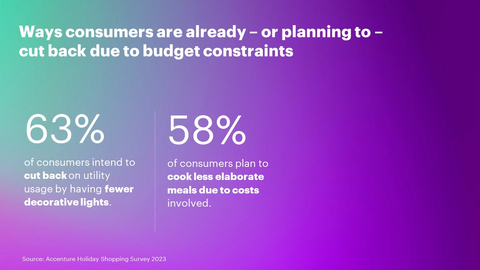Financial Pressures Spurring ‘Creative Pragmatism’ as U.S. Holiday Shoppers Look to Make Festive Dollars Work Harder, Accenture Survey Finds
17th Annual Holiday Shopping Survey highlights consumers plan to cut back on giving gifts to family and friends this holiday season

How consumers are already—or planning to—cut back due to budget constraints (Graphic: Business Wire)
The survey of more than 1,500
“The current economic environment is having an impact on consumer confidence, resulting in what could be an emergence of far more considered shoppers that might be described as "creative pragmatists” – who, while being grounded in the reality that they may need to cut-back in some areas, are also finding innovative ways to make their festive dollars stretch further, such as buying materials to make homemade gifts,” said Jill Standish, a senior managing director at Accenture who leads its Retail industry practice globally. “Retailers must be willing to rethink the tried and tested strategies of the past and focus on gaining a more nuanced, data-driven understanding of each individual consumer, and then using that insight to help reduce complexity of the shopping experience, build trust, and improve brand loyalty.”
Financial pressures feed into purchasing decisions
With fewer than 1 in 5 (
“Our findings suggest that this year, consumers are feeling the squeeze in their personal finances – not helped by emergency SNAP payments, which played a significant role in supporting low-income households during the pandemic, coming to an end,”
Another interesting shift retailers may see this season, is the potential reversal in the elongated holiday shopping season as consumers report they plan to start buying from October to December.
Lori Zumwinkle, a senior managing director at Accenture who leads its Retail industry practice in
Creative—yet pragmatic—approach to holiday shopping
The survey also shows that while price (
Many consumers appear to be exploring creative, yet practical, ways to make budgets stretch. For instance, some consumers indicated they are willing to compromise on convenience, with more than a half (
“In a season that’s particularly tied to nostalgia and tradition, retailers can take heart that consumers are still planning to spend this season. However, the way they spend will likely differ from past years. While some are undoubtedly taking steps to organize their seasonal shopping more carefully this year, others are focused on quality and consciously buying items they can enjoy all year around,”
About the Research
The Accenture 17th Annual Holiday Shopping Survey offers insights into consumer buying patterns during the holiday time period, providing an indication of retail performance expectations both on the high street and online at a key time for the sector. For this year’s study, Accenture surveyed a representative sample of 1,503
About Accenture
Accenture (NYSE:ACN) is a leading global professional services company that helps the world’s leading businesses, governments and other organizations build their digital core, optimize their operations, accelerate revenue growth and enhance citizen services—creating tangible value at speed and scale. We are a talent- and innovation-led company with approximately 733,000 people serving clients in more than 120 countries. Technology is at the core of change today, and we are one of the world’s leaders in helping drive that change, with strong ecosystem relationships. We combine our strength in technology and leadership in cloud, data and AI with unmatched industry experience, functional expertise and global delivery capability. We are uniquely able to deliver tangible outcomes because of our broad range of services, solutions and assets across Strategy & Consulting, Technology, Operations, Industry X and Song. These capabilities, together with our culture of shared success and commitment to creating 360° value, enable us to help our clients reinvent and build trusted, lasting relationships. We measure our success by the 360° value we create for our clients, each other, our shareholders, partners and communities. Visit us at www.accenture.com.
Copyright ©2023 Accenture. All rights reserved. Accenture and its logo are registered trademarks of Accenture.
View source version on businesswire.com: https://www.businesswire.com/news/home/20231023981972/en/
Tara Burns
Accenture
+44 7850 435 158
tara.burns@accenture.com
Source: Accenture







